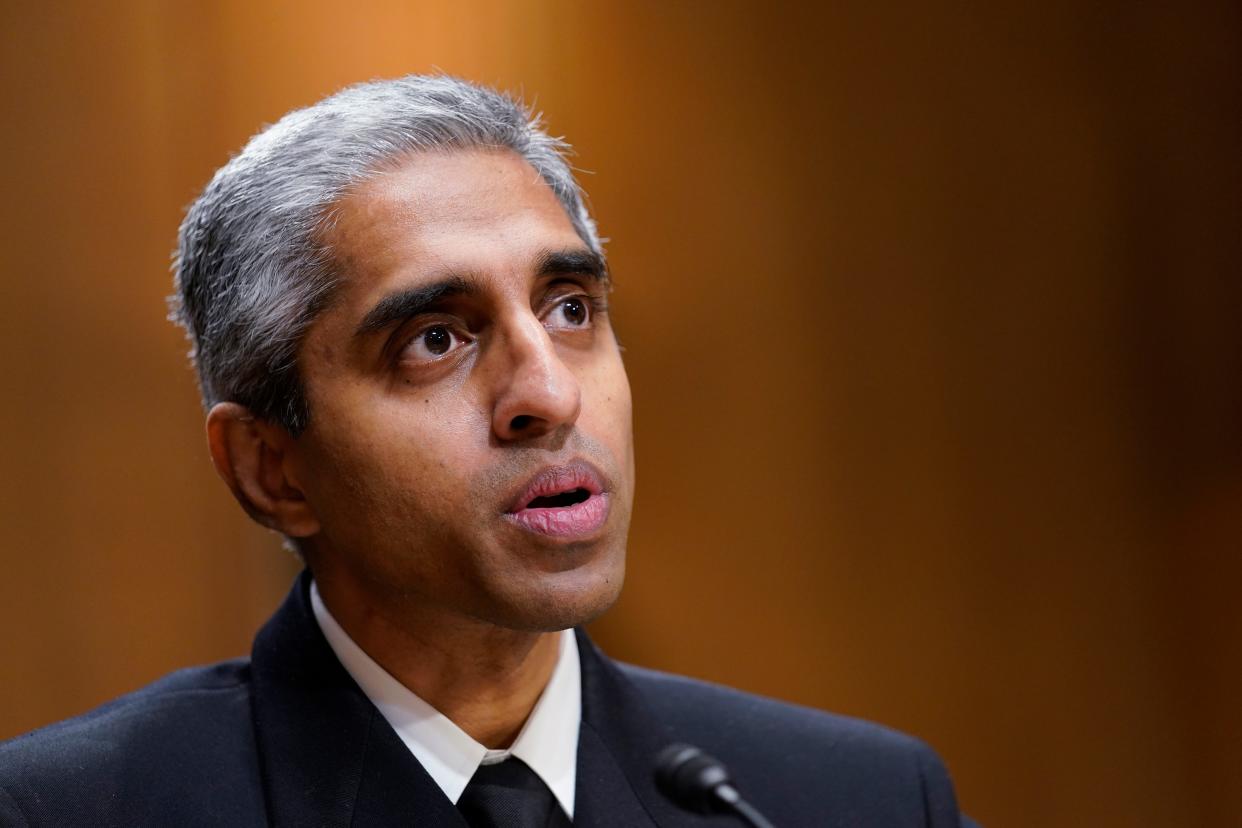Massachusetts lawmakers file measures to address mental health in children

BOSTON - By all accounts there’s a mental health crisis among the nation’s children. And the U.S. Surgeon General Vivek H. Murtha, U.S. Sen. Ed Markey and Gov. Maura Healey agree.
“The crisis is real,” Markey said during a recent online symposium with Murtha that gathered 100-plus legislators and professionals in the mental health field to discuss the problems and seek solutions. The meeting explored the interrelationship between mental health and young people’s use of technology and social media.
“They are dealing with a scourge of sadness and pain,” Markey said of the nation’s youth. “The weight of the world is on their shoulders.”
His job, Markey said, is to advocate for increases in federal funding for mental health services across the board in the United States. And to remind parents, Markey said, that they have rights when dealing with social media and technology:
Parents can demand social media companies ban ads targeted to their children.
Parents can demand that sites erase all gathered personal information and tracking.
Parents can enact social media controls.
Markey called technology and social sites a double-edged sword that simultaneously allows youngsters to find and build community while also exacerbating isolation and feelings of inadequacy.
Healey strong advocate for mental health care
Healey has been advocating for youth mental health supports and reforms even before her election to the corner office. As attorney general she used a $1 million grant from the U.S. Department of Justice to establish the first-ever Mental Health and Gender Affirming Care Resource Guide for LGBTQ2IA+, Young People and Their Trusted Adults.
And Massachusetts legislators have filed or refiled a number of bills seeking to change how the state addresses mental health issues in children and are hopeful that this is the year the measures cross the finish line and become law. Legislators have proposed:
A bill that calls for printing the national suicide prevention hotline number 988 on all student identification cards from middle school through college.
A bill that would address curriculum around teaching about mental health issues, ensuring it is taught similarly to physical health issues.
A bill that would increase school-based supports for youngsters, increasing the ratio of social workers and counselors to children throughout the state’s public school districts.
A bill that would ensure all students in public schools are evaluated for mental health issues, much as they are evaluated for physical illness and physical and developmental challenges.
A bill to classified school absences for mental health issues as excused.
“We are hopeful that this is the year the bill moves,” said Rep. Jack Patrick Lewis, D-Framingham, referring to the bill’s co-sponsors, Rep. Natalie Higgins, D-Leominster, and Sen. Jo Comerford, D-Northampton. Their measure would require student identification cards to be printed with the 988 Suicide & Crisis Lifeline prevention hotline.
“We have filed it in several sessions,” Lewis said, explaining that the delay in finalizing adoption of the number also delayed adoption of the measure. But this year, with the number firmly ensconced in Massachusetts and nationwide, Lewis is hopeful the measure will pass.
Help available at fingertips
The bill would put the number at a student’s fingertips, Lewis said.
“Students carry their ID’s everywhere. They need it for the bus, for lunch, it’s the best place for the crisis hotline number,” Lewis said. Some Massachusetts school districts and 17 other states, including neighboring New Hampshire, New York and New Jersey, have enacted the measure. “From the deepest blue states to the deepest red states,” Lewis said, suicide prevention among the youth is crucial.
Markey cites statistics related to youth suicide
One in three high school girls have seriously considered suicide: up by 60% in a decade.
One in 10 high school students have attempted suicide in the past year; among LGBTQ+ youth, that number is one in five.
There has been a 41% increase in suicide attempts by high school males, a 10% increase among girls.
In discussing the bill, Comerford noted that in 2019, before the onset of COVID-19, 17.5% of high school students seriously considered suicide.

“The pandemic only exacerbated the issue,” Comerford said, adding that with the national implementation of the 988 line last summer, there is now a free, easily accessible resource for students to get the help they need.
“I am proud to sponsor a bill that would require newly printed school ID cards for public school students, middle school through college, to include the 988 Suicide & Crisis Lifeline number,” Comerford said. “The commonwealth must do more to support the mental health of our youth, and adding a pointer on ID cards to an easily accessible tool is a step in the right direction.”
Another bill addresses curricula in Massachusetts public schools.
Teaching mental health issues similarly to physical health
The measure would have educators teach mental health as they teach physical health. Sponsors Sen. Nick Collins, D-Boston, and Reps. Higgins and Meghan Kilcoyne, D-Clinton, claim the measure could enhance understanding of mental health issues while addressing attitudes and behaviors that stigmatize struggling residents.
During the symposium held last week, Murtha pointed out that students learn about mental health issues at school.
“School is a place of connection and place to identify and start addressing issues,” Murtha said. School, he added, is where youngsters learn the social and emotional skills needed to navigate life and should be part of the overall education process.
Skills as part of overall ed experience
“I was in the hallway (of a Connecticut school) speaking with three fifth graders and while we were chatting, a fourth student walked by,” Murtha said, explaining that he noted the youngsters were very careful how they addressed the fourth student. The youngsters told him their friend had arrived angry and yelling at school; they speculated his mood stemmed from an issue at home, so they gave him space to calm down.
“They showed a level of insight and emotional maturity that allowed him a calming period and then checked in with him,” Murtha said.
He believes that young people are already reducing the stigma surrounding mental health issues and are more open to discussing issues and seeking help to deal with their struggles.
In discussing stigma, Rachel Riani, a development associate at Genesis Club, an international community-based mental health care recovery facilitator for adults with a clubhouse in Worcester, said that the feeling among staff is that there is now less stigma.
“People seem more open, willing to share,” Riani said, adding that stigma around mental health struggles is a barrier to access to care and support. “There has been no decrease in the numbers of people struggling but it seems it is easier for people to ask for help.”
Clubhouse helps people recover lives
Once therapy and medications for members have been formalized, the Genesis clubhouse offers the third leg of the recovery stool: a work-based day program, with a community that supports and helps members reclaim their lives.
“Our members work in one of six departments,” Riani said. Open daily from 8 a.m. to 5 p.m. Monday through Thursday and from 8 a.m. to 4 p.m. Friday, it offers job training and support, educational programs, health and wellness activities and active social supports. “On Saturday, we’re open from 10 to 2, we offer lunch, a place to get together, an opportunity to connect,” she said.
In his remarks, Murtha said: “The defining public health issue of our time us the mental health crisis in America.”
Increasing school-based supports is a key to addressing the crisis.
The bill sponsored by Sen. Becca Rausch, D-Needham and Rep. Ryan M. Hamilton, D-Haverhill, would provide those supports by increasing the numbers of social workers and counselors assigned to schools throughout the commonwealth. A bill offered by Reps. Priscila Sousa, D-Framingham, and James Arena-DeRosa, D-Holliston, would ensure all youngsters entering public school in Massachusetts, as pre-K and kindergartners or within 30 days of enrolling, are evaluated for mental health wellness.
“Youth is 20% of our population and 100% of our future,” Markey said. “We need to give them the tools they need to survive.”
This article originally appeared on Telegram & Gazette: Crisis in children's mental health targeted by MA lawmakers

